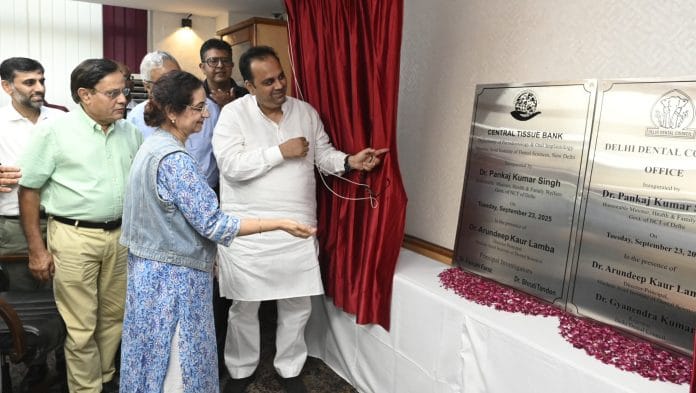New Delhi: After a five-year wait, Delhi got its first central tissue bank at the Maulana Azad Institute of Dental Sciences. This facility, which Health Minister Pankaj Singh launched on Tuesday, will provide freeze-dried bone and skin grafts for treatments and transplantation. It will also significantly reduce treatment cost.
“This sets new benchmarks in healthcare delivery and dental education in the country,” Singh had said.
The bank will reduce the cost by 25-30 per cent, directly benefiting patients undergoing procedures like jawbone repair, dental implants, periodontal surgeries, and even some dermatological treatments.
A tissue bank is a facility that collects, processes, and stores human tissues like bone, skin, or membranes that can be used for medical procedures. It is like a library of tissues. When patients need grafts or surgeries, doctors can take the tissues and complete the process.
“All tissues are carefully screened, sterilised, and preserved, and only then provided for transplant,” said Dr Archita Dutta, project manager of the tissue bank facility.
The bank is set up in the Department of Periodontology of the Maulana Azad Institute of Dental Sciences (MAIDS). It will help in vital reconstructive surgeries. Head of the department, Dr Farooq Faraz, received specialised training in Singapore to set up and run this kind of facility.
Earlier, any such treatment or transplant would have been referred to outside Delhi.
“We are aiming to regenerate the bone. Now, this bone which is available, is being imported and costs around ₹25,000–30,000 for one cubic centimetre (cc). If a patient wants an implant and there is no bone, in such cases, the cost for the entire surgical plan reaches somewhere around ₹60,000–70,000,” said Dutta.
Many patients who come with a problem are unaware that they can have their smile back, and this bank can help them.
“Roughly 60-70 per cent of the patients who come to us have some problem where bone regeneration could help. For them, these grafts can make dental implants or jaw repair procedures far more accessible,” the doctor added.
Also read: Salman Khan suffered from the worst pain. He said it’s called ‘suicidal disease’
How it works
Tissues will be collected from donors—living or deceased—after proper consent. They undergo strict screening for infections such as HIV and hepatitis, followed by sterilisation and preservation, often through freeze-drying. Stored grafts can then be supplied to surgeons when needed. The facility operates under the Transplantation of Human Organs and Tissues Act (THOTA), 1994, which regulates such activities in India.
To reverse dental bone loss, doctors perform bone grafting. It is one of the common procedures required for one out of four dental implants.
But the challenge is that people aren’t well aware of this in India. It is a lesser-known procedure than organ transplant. However, it has the potential to make a wide impact. One donor’s tissues can help many patients. If this functions properly, this bank can supply grafts to other hospitals in the future as well.
“Awareness is needed, donors are limited, and maintaining international-level safety standards is resource-intensive,” Dutta said.
This is Delhi’s first such central tissue bank. However, GTB Hospital has a bone bank where they conduct similar procedures.
“GTB has a bone bank, but it is used mainly by orthopaedics. They take bone, cryopreserve it at -80°C, and use it for one patient. What we are doing is different. We first store the bone, then process it further with demineralisation, freeze-drying, and gamma irradiation. With that, one bone can help treat many patients, especially in dentistry,” Dutta added.
If the MAIDS bank runs smoothly, it could become a model for replication in other government hospitals across the country, she said, adding, “As of now, patients are benefitting from this bank, but in the future, it can be expanded.”
Currently, the bank focuses on in vitro research and clinical studies. “Once the regulatory approvals are final, we plan to upscale production so that patients from other hospitals can also benefit,” said Dutta.
(Edited by Saptak Datta)






